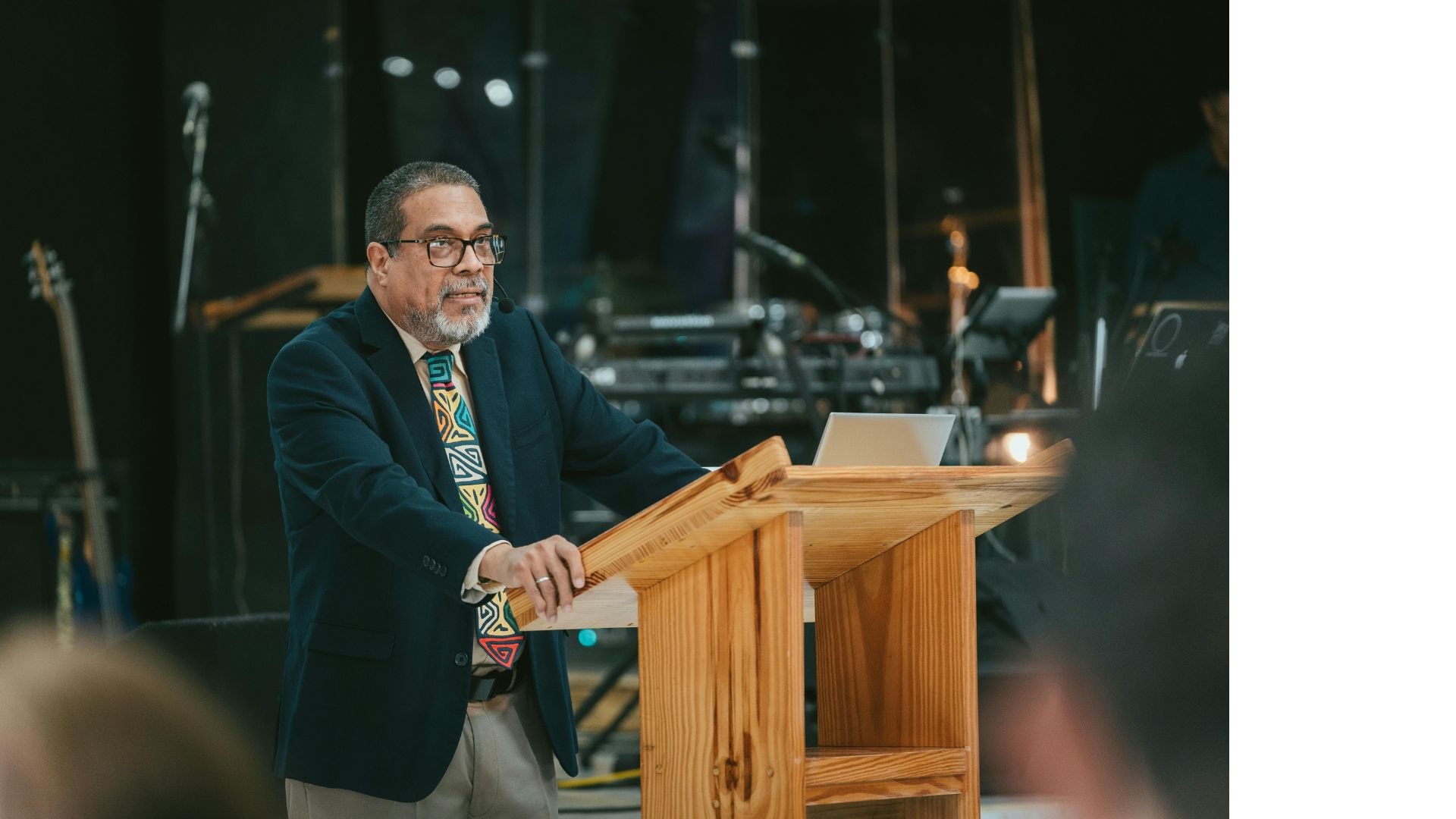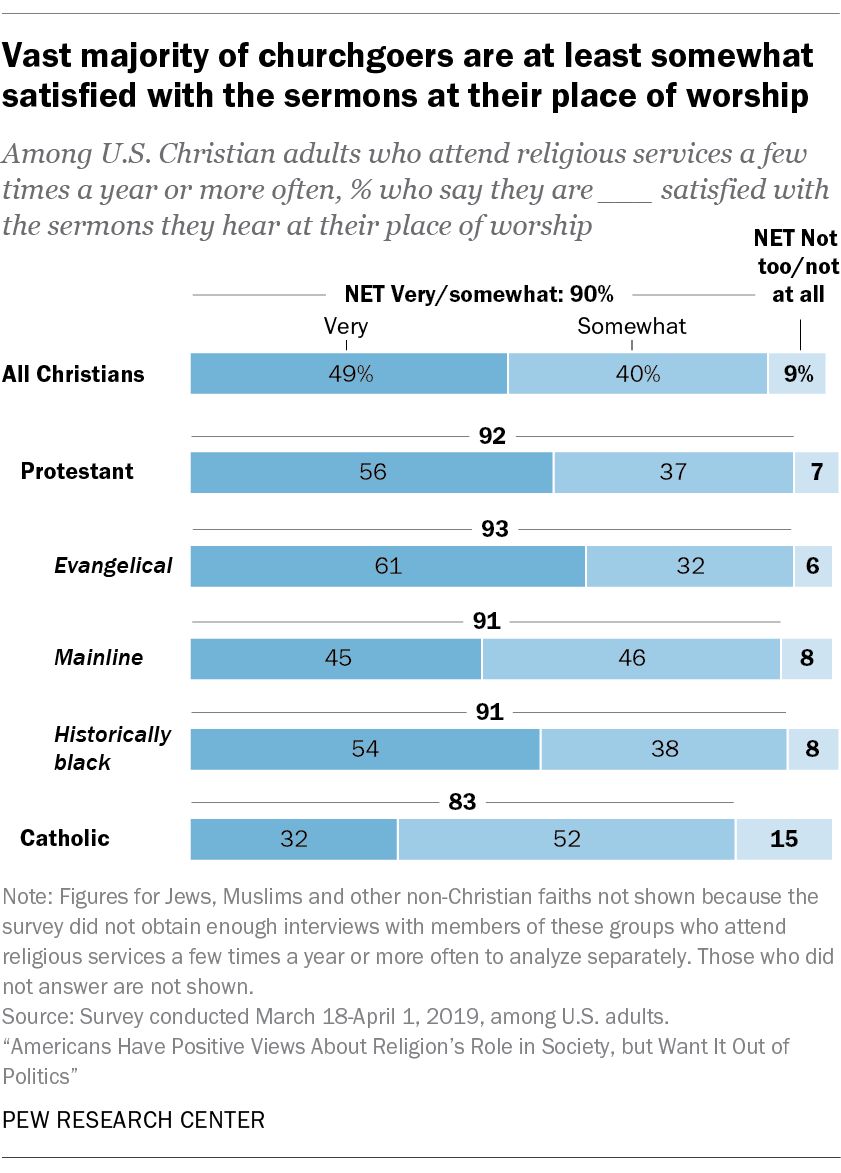If you’ve preached at or attended a church long enough, you know about sermon series. They are a thoughtful way to guide your congregation through a meaningful spiritual journey. Instead of focusing on one message, a sermon series allows you to explore a theme or biblical book in greater depth over several weeks. It provides a clear direction and helps people connect with the message week after week.
But crafting a sermon series is more than just prepping a single sermon. It requires lots of planning in advance and coordination with various other church elements. Thankfully, developing a sermon series doesn’t have to be complicated. In this podcast, we’ll break down everything you need to know about planning a sermon series and provide you with 7 actionable steps you can take to walk you through the process.
Sound good? Let’s jump in.
Estimated reading time: 11 minutes
Table of contents
A Sermon Series?

A sermon series is a set of messages planned and preached over several weeks that focus on a common theme, book of the Bible, or topic. Instead of delivering a standalone sermon each week, a pastor can take the congregation on a journey that builds week after week. Sermon series can be based on a specific book of the Bible, such as Ephesians, or on a topic like prayer or faith.
One of the advantages of a sermon series is that it allows the pastor to teach more deeply on a subject, giving time to explore it from different angles. This approach not only helps church members connect the dots but also keeps them engaged over time.
According to Pew Research Center, 40% of churchgoers are somewhat satisfied with the sermons preached each week. With engaging sermon series, we might be able to decrease the number of somewhat satisfied Christians and increasethe number of very satisfied Christians!

Preaching Calendars
A key tool in developing sermon series is the preaching calendar. A preaching calendar allows pastors to plan upcoming sermons over the course of several months or even an entire year. This can include not only the themes for a sermon series but also individual sermon titles, Scripture passages, and key points.
By organizing a sermon series calendar, pastors can ensure that they cover a range of topics throughout the year, helping the congregation experience the entire Bible over time. This also gives church leaders time to align worship, activities, and small group studies with the themes of the series.
Planning ahead also means the pastor can avoid last-minute sermon prep, giving more time for prayer and study, which leads to stronger messages.
Expository Preaching
Sermon series often work well with expository preaching, where a pastor goes through a book of the Bible verse by verse. This approach helps the congregation understand the context of Scripture, not just isolated verses, and ensures that the full message of the Bible is taught. Expository preaching in a sermon series format can be particularly helpful in guiding church members through complex or lesser-known books of the Bible, giving them a richer understanding of God’s Word.
Another benefit of sermon series is that they can be aligned with the church calendar. For example, series on topics like Advent, Christmas, or Easter can be planned to coincide with key events in the Christian year. This helps the congregation focus on the themes of the season, such as hope, sacrifice, or resurrection. A well-planned sermon series calendar can ensure that these special times are given the attention they deserve while also balancing the teaching of broader biblical themes.
Sermon Series
Sermon series offer numerous benefits for both pastors and congregations. With the help of a preaching calendar, pastors can plan upcoming sermons to cover important topics and books of the Bible over time. Whether through expository preaching or topical series, this approach helps church members grow deeper in their faith and understanding of the entire Bible.
By aligning the series with the church calendar and collaborating with church leaders, pastors can create meaningful and impactful journeys for their congregations, week after week.
7 Steps to Sermon Series Planning

And that’s everything you need to know about sermon series! As you can see, they can be really helpful tools to add depth and variety to your church’s messages. On the other hand, they can seem daunting and complex to plan. That’s where this section comes in.
Here, we’ll take you through a step-by-step process of planning a sermon series from start to finish. By following each of these steps, you’ll be able to plan a sermon series without feeling overwhelmed. If you’re new to preaching or you’ve spoken a hundred messages, this process can be helpful for you.
Let’s dive in.
Step 1: Pray
The first step in crafting a sermon series, just like the first step in anything, is to pray for guidance. Before choosing a theme or writing any sermons, it’s important to seek direction from God. Prayer allows pastors to connect with the Holy Spirit, who leads and inspires us. By praying, you open your heart and mind to hear what God wants to communicate to your congregation.
Here’s the truth: the Holy Spirit knows the needs of your church better than anyone else and can provide insight into what messages will be most impactful. Take time to pray for wisdom, clarity, and focus as you plan. Trust that the Holy Spirit will guide you in selecting the right topics, Scriptures, and lessons.
Taking this vital step ensures that your sermon series is not just about your ideas but is led by God’s purpose for your church, making the messages more powerful and meaningful. Just like everything else in life, you don’t want to do it without God.
Step 2: Identify Theme
Once you’ve prayed for guidance, the next step in sermon preparation is to identify the theme for your sermon series. The theme is the central idea or message that ties the sermons together. It could focus on a specific book of the Bible, a character, or a relevant topic, such as faith, hope, or relationships.
When deciding on a theme, consider what your congregation needs to hear. Is there a topic that will encourage them, help them grow, or deepen their understanding of God’s Word? Sermon planning becomes easier when you have a clear theme because it provides direction for each message. The theme should be broad enough to cover several sermons but focused enough to keep people engaged.
Once you have a theme, you can start breaking it down into specific messages, helping you stay organized as you move forward with your sermon series. Don’t miss how important this step is! Always keep your main theme in mind when prepping each message to keep them centered on the point of your preaching.
Step 3: Create Title
After choosing your theme, the next step is to create a title for your sermon series. A good title grabs attention and makes sense. It should be simple, clear, and help people understand what the series is about.
For example, if your series focuses on Proverbs or other wisdom literature, you might use a title like “Words to Live By” or “Everyday Wisdom”.
Here are a few tips for creating a title:
- Keep it short and clear.
- Reflect your main theme.
- Make it engaging and memorable.
Step 4: Develop an Outline

Once you have a theme and title, it’s time to develop your outline. This step is crucial because it helps you organize your thoughts and ensures that your sermon series flows smoothly from week to week.
Start by breaking down your theme into several main topics or ideas. Each of these will become an individual sermon in the series. You’ll want to plan ahead so that every sermon builds on the last, creating a cohesive journey for your congregation.
As you develop your outline, include Scripture from both the Old Testament and the New Testament to provide a well-rounded perspective. For example, if your theme is about faith, you might begin with an Old Testament story like Abraham’s faith in God’s promises, then move to a New Testament passage like Hebrews 11, which highlights faith in action. By using different parts of the Bible, you help your congregation see the full scope of God’s plan and how the Scriptures connect across time.
A clear outline not only helps you stay organized but also gives your congregation a sense of direction. They’ll know what to expect each week, and you’ll be better prepared to deliver a meaningful and impactful sermon series.
Step 5: Prepare First Sermon
After developing your outline, it’s time to prepare the first sermon. This is where many preachers start to feel the real weight of the series. It’s important to take your time and carefully begin work on crafting this first message, as it sets the tone for the entire series.
Start by revisiting the theme and focus on how to introduce it clearly and effectively to the congregation. The first sermon should grab attention, explain the purpose of the series, and build excitement for what’s ahead.
As you prepare, think about how you can connect ministry to the message, showing practical ways the church can apply the lessons from the sermon. Keep the message focused and simple, allowing room for personal stories, Scripture, and application.
For many pastors, they need to start preparing the first message to fully understand the feel they want for the series. By starting strong, you’ll draw your congregation into the series and set a solid foundation for the sermons to come.
Step 6: Coordinate Elements
Coordinating worship and other elements is an important part of making your sermon series impactful. Worship, prayers, and announcements can all connect to the theme, creating a unified experience for the congregation. Work with your worship leader to choose songs that reflect the message of each sermon. This helps reinforce the theme and makes worship more meaningful.
Think of the entire service as a balanced diet—it should feed people spiritually through different parts, not just the sermon. Along with music, consider other elements like:
- Scripture readings that match the theme.
- Prayers that align with the message.
- Announcements or activities that encourage further engagement.
When everything in the service works together, the congregation can more easily absorb the message and apply it to their lives. Coordinating these elements ensures that each part of the service contributes to a full, rich spiritual experience.
Step 7: Evaluate
After completing your sermon series, it’s important to take time to evaluate how it went. This step allows you to reflect on what worked well and what could be improved for future series. You might start by asking for feedback from your congregation. This can be done through informal conversations or even a simple survey to understand how the series impacted their faith and lives.
It’s also helpful to reflect personally. Were you able to stay focused on the theme? Did each message build upon the last? Did the series meet the spiritual needs of the congregation?
Consider how well you connected with your worship team, lead pastor, and other church leaders to create a unified service each week. Evaluating the series gives you valuable insights and helps you grow in your preaching and sermon planning for the future.
Planning Your Sermon Series

In conclusion, creating a sermon series is a powerful way to deepen the spiritual journey of your congregation. By praying for guidance, identifying a clear theme, and carefully preparing each sermon, you set the stage for a meaningful and impactful series. Coordinating worship and other elements ensures a cohesive experience that reinforces the message week after week.
As the series progresses, it’s important to evaluate its effectiveness, seeking feedback and reflecting on your own experience. This process helps you learn and grow, enhancing your ability to deliver impactful messages in future series.
Ultimately, a well-planned sermon series not only enriches the lives of your church members but also strengthens their connection to God’s Word and to each other.
More Resources on Sermon Series





